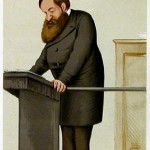Which came first? Evangelicalism or Republicanism? You hear a lot from evangelicals who have been involved in politics that their convictions about government, foreign policy, and economics come both directly and indirectly from faith. But I have long wondered if faith is the language some Americans use to justify their politics. Part of what got me wondering was a review that Fintan O’Toole wrote of Marcus Tanner’s Ireland’s Holy Wars. I quote from a paper in which I cited O’Toole:
O’Toole raises a set of questions that students of the Protestant Right or its antecedents have rarely considered. “Is religion simply a pretext, an epiphenomenal expression of political and social and economic grievances, one excuse for violence among the many excuses that are possible?” The answer to this question, O’Toole adds, is key. “If religion is itself the cause of conflict, then we are indeed doomed to an endless series of holy wars. If it is an excuse, a way of making ordinary struggles for political advantage seem less squalid and more epic, then the source of conflicts is to be sought in the failure of politics.” O’Toole goes on in this review to suggest that the struggle in Northern Ireland is indeed a failure of British politics, with religion providing merely the language for the disputants. “Only a fool,” he concedes, “would deny that the Troubles in Northern Ireland or the sporadic episodes of rebellion and repression in the previous five centuries can be understood without taking account of the division between Catholics and Protestants.” What O’Toole denies is that religion is the “primary source” of these conflicts. “It makes more sense . . . to think of religion as the weapon that has been used to cause the wound.” As such, Northern Irish used Christianity “at different times and in different ways in the pursuit of economic and political advantage.”
A recent study of British evangelicalism makes a similar point, namely, that social location may make more sense of faith-based politics than faith itself:
‘There is no sign of the kind of tight-knit, symbiotic relationship between a right- of-centre political party and a unified Christian constituency emerging in the Britain as it did in the last quarter of a century in the US.’
I also found that British evangelicals are not nearly as convinced of the need for a smaller state and free-market policies as their American counterparts. British evangelicals are just not as easy to categorise as simply ‘right-wing.’ Evangelical Christians in Britain are more socially conservative than the general public, but their economic bias is left-of-centre, arguably more so than those of no religious faith.
We found a number of reasons why British evangelicals (and the wider Christian community) remain relatively socially conservative but are not as politicised as American evangelicals Firstly, the establishment of the Church of England – and its more gentle and constructive approach to political engagement. Secondly the media landscape here – with only a fraction of the Christian media outlets accessible in the US. Thirdly, the left-leaning commitments of the majority of British Roman Catholics. Fourthly, the apolitical nature of senior British evangelical leaders, such as John Stott and Tom Wright. The final reason we don’t have a potential Trump-style support base among British evangelicals is the size of the constituency – the number of evangelicals is about two million, only around seven per cent of the total UK population, and they are spread fairly evenly nationally.
Just one more reason for wondering about social scientists who use evangelicalism to explain Americans.












